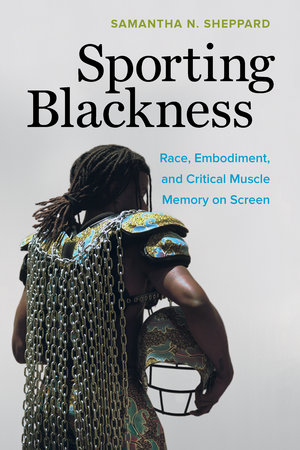This guest post is part of our #SCMS2021 conference series. Visit our virtual exhibit to learn more.

In this video, scholar Samantha Sheppard offers a sneak peek at her book, Sporting Blackness: Race, Embodiment, and Critical Muscle Memory on Screen.
“In her fusion of theories of race and blackness with her concept of critical muscle memory, Sheppard offers a new analytical paradigm applicable beyond the genre at the center of her study. . . . Sporting Blackness is packed with joy, resistance, and hope—much-needed attributes in this time.”
—Film Quarterly
“Sporting Blackness represents a thoughtful, vibrant and absorbing contribution to our understanding of race, sport and media. . . . As we look to make sense of the current racialized and racist world we live in, and facilitate our students to do the same, Sheppard’s outstanding book will no doubt prove to be an instructive and indispensable resource.”
—Ethnic and Racial Studies
Sporting Blackness examines issues of race and representation in sports films, exploring what it means to embody, perform, play out, and contest blackness by representations of Black athletes on screen. By presenting new critical terms, Sheppard analyzes not only “skin in the game,” or how racial representation shapes the genre’s imagery, but also “skin in the genre,” or the formal consequences of blackness on the sport film genre’s modes, codes, and conventions. Through a rich interdisciplinary approach, Sheppard argues that representations of Black sporting bodies contain “critical muscle memories”: embodied, kinesthetic, and cinematic histories that go beyond a film’s plot to index, circulate, and reproduce broader narratives about Black sporting and non-sporting experiences in American society.
Samantha N. Sheppard is the Mary Armstrong Meduski ’80 Assistant Professor of Cinema and Media Studies in the Department of Performing and Media Arts at Cornell University.